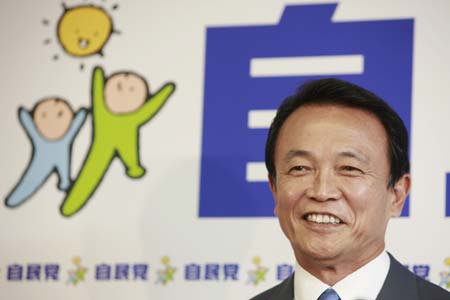Newly-elected Liberal Democratic Party (LDP) boss Taro Aso is virtually certain to become Japan's next prime minister succeeding outgoing Yasuo Fukuda, as his party controls the lower house of the parliament.
 |
|
Taro Aso, newly elected president of Japan's ruling Liberal democratic Party (LDP), attends a news conference after his election in Tokyo, capital of Japan, September 22, 2008. Taro Aso was elected LDP's party chief on Monday. [Ren Zhenglai/Xinhua]? |
But what remains uncertain is how will the outspoken Aso steer the government out of political and economic predicaments.
Economic challenges?
Japan's economy is hurt by high prices of energy and raw materials and a global economic recession led by the United States. Aso has indicated that he will put priority to spur the economy within three years through a proactive fiscal policy.
To achieve the bold target, he said he would be "flexible" about balancing the budget in 2011 and revealed enthusiasm about increasing government spending.
He said he will stick to the promise the earlier government has made to increase the government's funding on pension. He aimed at doubling the consumption tax, which now is set at a flat five percent, to cover the rising welfare costs in one the world's most aging societies.
But raising the consumption tax is a politically sensitive move and he recently said he would not heighten the tax until the economy improves.
However, Aso is yet to roll out a concrete plan on how to bail out the Japanese economy amid a world economic slowdown and how to deal with the embarrassment of a relatively insufficient young work force, who pay most of the tax.
General election ?
The opposition Democratic Party of Japan (DPJ), which won a majority in the upper house in July last year, is demanding the election for the lower house, which has the final say, be held immediately.
Japanese constitution allows the prime minister to call the election any time before next September.
But calling such elections could be risky for the LDP, who have governed Japan for more than half a century but are losing public trust over the scandal of pension funds and discontent over many other issues.
The LDP now take up two thirds of the seats in the lower chamber and can have the prime minister's decisions forcibly approved in the house, even if they are blocked in the upper house.
Local press said the key point in the next lower house election is which party, the LDP or the DPJ, will become the largest force in the 480-member lower house. The LDP and New Komeito aim to grab at least 241 seats to maintain the coalition's majority.
Aso's party faces a life-or-death situation in the election as it will reveal the people's hearts toward the party, the Yomiuri Shimbun's editorial read Tuesday.
Speculation is growing that Aso may dissolve the lower house as early as October 26 to call a general election, as he now garnered a 59 percent support in a recent Yomiuri Shimbun opinion survey. The launch of a new Cabinet usually boosts support rates and would benefit the LDP-New Komeito ruling bloc if an election is held immediately.
Foreign policy
Aso is known for his blunt comments on domestic and foreign policies. He had said visiting the Yasukuni Shrine is a domestic issue and must not create diplomatic tension with China and South Korea. But he refused to say whether he would visit the shrine or not.
In his most recent publication, "An Extraordinary Japan", he says China's development as a major economic power is "favorable" and bilateral relations must overcome the past with a focus on "reconciliation and cooperation".
A former foreign minister, Aso is likely to remain objective and in tune with public opinion. Foremost, he had to prioritize domestic issues over foreign policies, according to a report by the Congressional Research Service.
(Xinhua News Agency September 23, 2008)